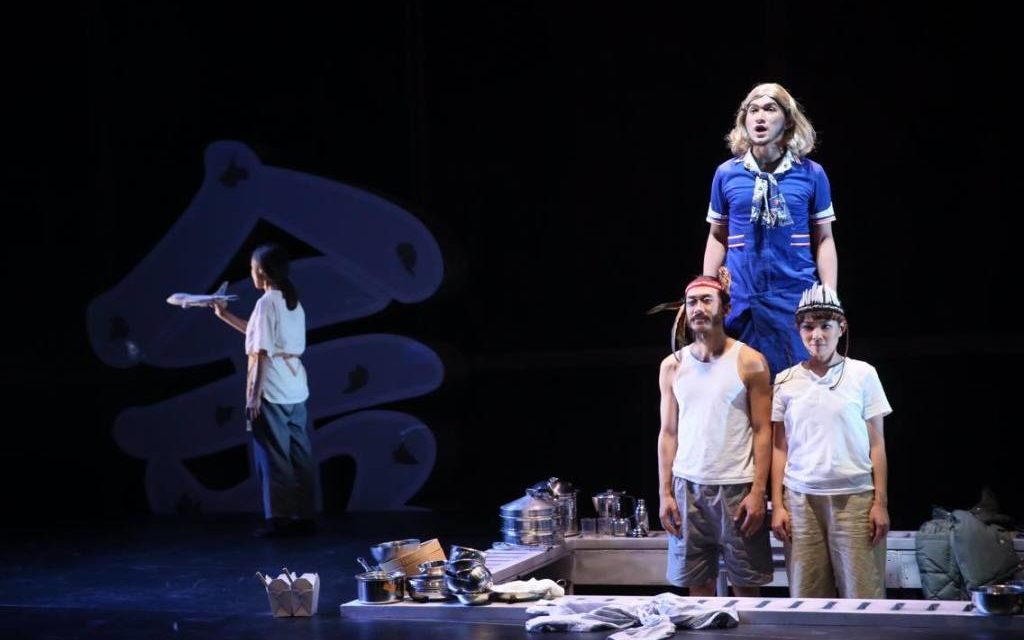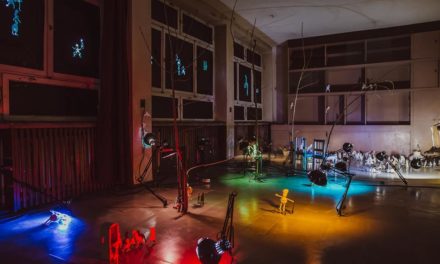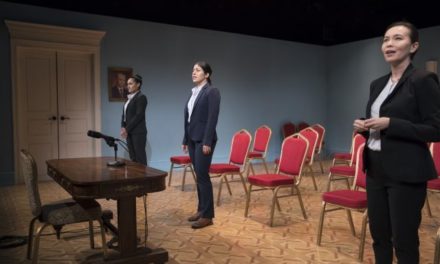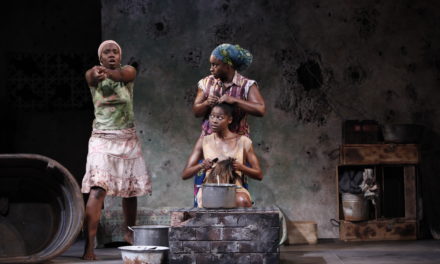Roland Schimmelpfennig ‘New Writing’ masterpiece Der Goldene Drache (The Golden Dragon) explores the illegal immigration problem in Germany. Yet, it does not stop at the point of criticising it but actually becomes a poetic non-linear bildungsroman by looking at each character’s emotional journey.
First published in 2009, Der Goldene Drache has shaken up the European and North-American theatre scene, where countless of productions has been put on in areas including Edinburgh, New York, Toronto, and even in Hong Kong when On & On Theatre produced it in 2013 under Chan Ping Chiu’s direction.
Three years later, Mr Chan re-directs Mr Schimmelpfennig’s play with updated staging. The result is beyond spectacular, as Mr Chan personally upgrades Mr Schimmelpfennig’s play with a stellar cast. One should not miss it for all-rounded theatrical excellence.
The play starts with a tooth aching incident happened in a boiling kitchen of ‘The Golden Dragon,’ a Chinese-Thai-Vietnamese restaurant somewhere in Germany where five Chinese immigrants work in that kitchen. The one who is having the toothache is a young teenage boy who turns out to be an illegal immigrant, thus going to the dentist totally cannot be considered.
From this, we then see other characters and their stories who live in the area near ‘The Golden Dragon’, that includes a story between a cricket and an ant, a drunkard whose wife is leaving him, two flight attendants and their own personal tales of tasting their opposites. Gradually, the audience will see the linkage of all these characters, and slowly, we are entering a tale that starts from bright and funny to dark, tragic, and bloody.
It is no doubt that Mr Schimmelpfennig’s journalistic background gives Der Goldene Drache such an exquisite tone of coldness, yet one can also see his excellent craft in a structure for ‘New Writing’ performances. Even though it is a theatre performance, an art form that begs for compassion and emotions, which tackles one controversial political topic, Mr Schimmelpfennig’s play still stands in the middle.
The writing gives the audience some breathing room to really examine each character’s motivation as well as to question their endings. I can say it is a tragedy, but are the ones that end up tragically really that innocent, or are these people really that stereotypically bad? Mr Schimmelpfennig just gives you room to interpret.
With its German root, Mr Schimmelpfennig’s play is absolutely channelling Bertolt Brecht’s ‘Verfremdungseffekt,’ or ‘Alienation Effect.’ Five actors, specifically indicated with their genders and age ranges, switch roles of dozens within the two-hour show. Not only that, Mr Schimmelpfennig also cleverly demands each character to be played by an actor who is totally the opposite of the character in terms of gender and age. It really gives the audience to detach from the heated and tragic situation and cool down and think again.
Yet, the most profound element that I find during the viewing is that Mr Schimmelpfennig’s ultimate criticism is to the theatre audiences, or the nature of them. The tooth that drops into the bowl of soup with Asian exotic flavour later gets tested by a flight attendant who is specifically blonde. She tastes and tastes, then once the flavour is gone, she just spits it out into the river.
I immediately thinks of Mr Brecht’s Der gute Mensch von Sezuan (The Good Woman of Setzuan) which has the similar criticism on the theatregoers, just like the gods in the play who have heard the tragic story of Shen Teh, but are unwilling to help her since, as they say, they cannot do anything.
The flight attendant in Goldene Drache is the gods in Setzuan, which is the audience who similarly cannot or will not do anything after the show. And to think of that just gives me goosebumps as how Mr Brecht prophesies the nature of audience as well as how Mr Schimmelpfennig pulls this theme closer to the contemporary world.
Der Goldene Drache is a text that is totally for theatre, but it is also a trap for directors to bundled into the politics of the play and lean on one side or another, as well as to make the play much more of a propaganda instead of just being a theatrical piece. Here is where I need to give an ovation to Mr Chan for his immense strength of being a director.
It is regrettable for me of not seeing Mr Chan’s production in 2013. I just recently pick up productions from On & On Theatre Workshop, one of the renowned theatres in Hong Kong that promotes ‘New Writing’ theatre, within the last two years. I saw two productions of Mr Chan’s own work, both writing and directing for Waking Dreams in 1984 and Postcolonial Affairs of Food and the Heart. To be frank, both are not up to par. I can see that Mr Chan is struggling in the form of writing that he somehow slacks off his talented directing skills.
However, his production of Der Goldene Drache really claims back his name as a director that really serves Mr Schimmelpfennig’s play faithfully with strong vision. To much of my surprise, the production is full of twists and turns of spectacles. The play is specifically designed with calculated sequences that a director has to be mature enough to clear up the logic of the writing for the visual on stage.
Mr Chan absolutely has done his job, even more than fulfilment. Every set of staging is beautifully constructed. The transitions are seamless and on point, accompanied with live music, that as if Mr Chan’s production is the premier of Mr Schimmelpfennig’s writing. To see such product of a marriage between two giants in theatre of two different areas is just a delightful.
It is interesting that a play about Chinese immigrants, usually played by white people in Western productions, is now played back by Chinese. Thus, it is also a nice treat for the actors to speak in German occasionally through the show, as it gives an atmosphere of Germany, that this story is not Chinese-rooted.
Also, there is a theme about trying to be the opposite of oneself (the tasting of the tooth, the clothes-swapping between the pilot and his flight attendant girlfriend), thus having the actors to speak German exaggerated the theme of imitating another ethnicity upon the role-switching form.
These are brilliant and well-thought ideas, and one can see Mr Chan’s direction and mind are with delicacy.
Designed by Yuen Hon Wai and ‘Sun Fool’ Lau Ming Hang respectively, the set and lighting are constructed in a very clever way with such high skill craft. The nearly bare stage with a tiny kitchen area in the middle, towered with two big Chinese character of ‘The Golden Dragon’ as the marquee of the restaurant, gives out magic when the play unfolds.
I feel very excited whenever there is a light change or a surprise hidden in the set, and not to mention without losing authenticity. Mr Yuen and Mr Lau are already renowned designers in the Hong Kong theatre field, but this I can say is their best work yet.
The only tiny criticism is the acting ensemble which there is still a bit of imbalance of energy and style, but comparing to previous performances of them, this group of five actors is stellar and engaging, and most importantly, very honest and clean with their acting.
Lee Chun Chau is standardly brilliant, professing his craft at his usual best. Wan Yuk Yu as the tooth-aching Chinese boy and Anson Chan as the tooth-tasting flight attendant are both charming. Leung Tin Chak as the shirtless cricket has improved a lot since my last view of him in Waking Dreams. This time he is much more solid in animating, and his beautifully built body really catches attention.
However, Cheng Yi Chai as the exploiting ant is beyond magnificent. I was spell-bound by Miss Cheng when I first saw her in Vee Leong’s Fragments of Stones and Gold with her eloquent vibe of calamity and honesty. This time, Miss Cheng has actualised herself for being a variety of different characters, with an excellent precision of reading and strength. Whenever she treads upon the stage, she graces the space. When I heard her cry of agony at the end, that solid vocal work, my heart stops. Somebody please give her a play to lead!
Production Credits:
Der Goldene Drache by Roland Schimmelpfennig
Studio Theatre, Hong Kong Cultural Centre
Performed in Cantonese
Closed on 18th December 2016
This article by Clement Lee was originally published on The Typewriter. Reposted with permission. Read the original article and The Typewriter’s art page.
This post was written by the author in their personal capacity.The opinions expressed in this article are the author’s own and do not reflect the view of The Theatre Times, their staff or collaborators.
This post was written by Clement Lee.
The views expressed here belong to the author and do not necessarily reflect our views and opinions.


















